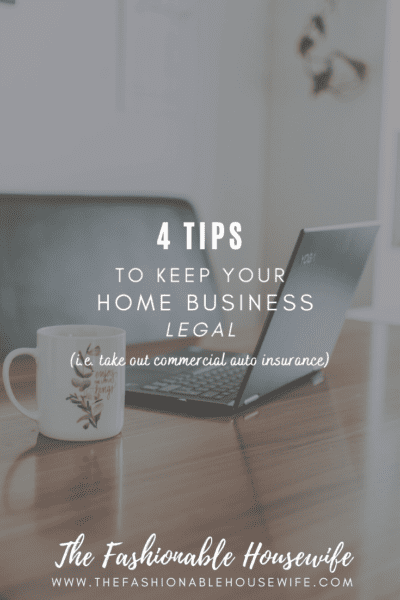(i.e. take out commercial auto insurance)

Starting a home business has dozens of potential benefits. It will allow you to choose your work routine, have more autonomy over your career, and spend more quality time with your family. Setting up a home business has relatively low costs and is typically easier than other business types. However, you must still consider the legal requirements and take steps to ensure that your business is compliant. On that note, here are four tips to keep your home business legal.
1. Check whether you need commercial auto insurance
If you use your car for business purposes, then you will need to take out commercial auto insurance to provide coverage in case of an accident. Keep in mind that you will need to have business auto insurance even if you don’t use your vehicle regularly. Some situations when you require cover include visiting clients, making deliveries to customers, and traveling to different work locations. In these situations, your regular auto insurance will not cover you, so you must take out additional business insurance. Having commercial auto coverage will protect your business finances against damage and personal injury if you have a car accident while working.
2. Choose the most appropriate business structure
When you start a home business, you will need to choose a structure for your company. There are several different business structures available, each with various advantages and disadvantages. You must compare the options carefully and choose the most appropriate structure for your business. Here are details on some of the most common business structures:
- Sole proprietorship – This is usually the quickest and easiest way to set up your home business and there is no registration fee. However, you will be personally liable if your company fails or falls into debt.
- Limited liability company (LLC) – This structure is more difficult and time-consuming to set up, but it means you won’t be held personally responsible if your company becomes bankrupt or has outstanding debt.
- Partnership – This is where you go into partnership with another self-employed person and you share the workload and profits.
3. Make sure that your business name is available
Make sure that your business name is available by using a free name search tool online. If you find that another company is using your business name, then consider picking a different name or pay for a comprehensive name search. This will ensure that you don’t violate another business’s trademark or run into issues once you start operating your company.
4. Apply for the necessary permits and licenses
Most home businesses must apply for various permits and licenses to operate legally. The requirements vary between states, so make sure you check what is required before launching your company.
Home businesses may need the following licenses and permits: “general business license, professional license, health and safety permit, food handler permit, and sales tax license”. Failing to obtain the required licenses and permits can cause serious issues for your business later down the line, so always check what is needed to run your home business legally.



